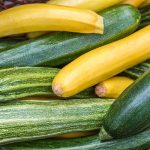 The squash that means edible gourd is a completely different word than the squash that means painful racquet sport. Squash, the sport, gets its name from the small, hollow ball being squashed into a little disk each time it hits a wall of the court or a shoulder blade of an opponent. In turn, the verb squash derives from the Vulgar Latin exquassare, meaning to squeeze out (the base of this verb—the Latin quassare, meaning to shake to pieces—is also the source of the English word quash, meaning to annul). In contrast, the edible squash derives from Narraganset, a Native American tongue belonging to the Algonquian family of languages. The Narraganset word for squash was asquutasquash, meaning something eaten raw, a word that English initially adopted as squanter-squash in 1634. The name squanter-squash continued to be used in English until the early eighteenth century when it was superseded by the abbreviated form, squash. Incidentally, the ash that appears at the end of the original Narraganset word—asquutasquash—is actually a suffix that indicates the word is plural (English likewise refers to certain foods only in the plural—oats, for example, and grits). The same plural ending is also found on succotash, the name of a Native American dish made by boiling green corn with beans. Succotash is also of Narraganset origin, deriving from misickquatash, meaning ear of corn. However, the word calabash—the name of a large, hard-shelled gourd—is not of Native American origin, even though it ends in ash. Instead, calabash derives ultimately from the Persian kharbuz, a compound made up of khar, meaning large, and buza, meaning fragrant fruit. This Persian word was adopted by Spanish as calabaza, which English adopted as calabash at the end of the sixteenth century.
The squash that means edible gourd is a completely different word than the squash that means painful racquet sport. Squash, the sport, gets its name from the small, hollow ball being squashed into a little disk each time it hits a wall of the court or a shoulder blade of an opponent. In turn, the verb squash derives from the Vulgar Latin exquassare, meaning to squeeze out (the base of this verb—the Latin quassare, meaning to shake to pieces—is also the source of the English word quash, meaning to annul). In contrast, the edible squash derives from Narraganset, a Native American tongue belonging to the Algonquian family of languages. The Narraganset word for squash was asquutasquash, meaning something eaten raw, a word that English initially adopted as squanter-squash in 1634. The name squanter-squash continued to be used in English until the early eighteenth century when it was superseded by the abbreviated form, squash. Incidentally, the ash that appears at the end of the original Narraganset word—asquutasquash—is actually a suffix that indicates the word is plural (English likewise refers to certain foods only in the plural—oats, for example, and grits). The same plural ending is also found on succotash, the name of a Native American dish made by boiling green corn with beans. Succotash is also of Narraganset origin, deriving from misickquatash, meaning ear of corn. However, the word calabash—the name of a large, hard-shelled gourd—is not of Native American origin, even though it ends in ash. Instead, calabash derives ultimately from the Persian kharbuz, a compound made up of khar, meaning large, and buza, meaning fragrant fruit. This Persian word was adopted by Spanish as calabaza, which English adopted as calabash at the end of the sixteenth century.
Within the expansive realm of botany, an assortment of plants belonging to the esteemed Cucurbita genus grace our Earth, offering their captivating presence. These botanical wonders manifest in the form of squashes, presenting an intricate tapestry of diversity. It is not uncommon to encounter these splendid creations referred to as summer or winter squashes, although a more precise classification would aptly distinguish between the supple embrace of soft-shelled varieties and the resilient fortitude of their hard-shelled counterparts.
